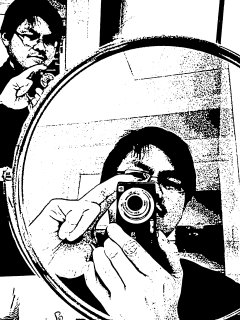Sunday, March 09, 2008
Beijing, China, 29 Feb-2 Mar 2008: 老百姓
Common Folk
Less than 6 months to the Summer Olympic Games, Beijing is a hive of construction activities. In the Forbidden Palace, scaffoldings clad the 3 Great Halls, and modern slate tiles replaces uneven stone slabs gouged out from the ancient hallowed squares. Large parts of the traditonal Dazhalan quarters near Qianmen and hutongs adjacent to Wangfujing Street have been systematically torn down, their detritus shielded by giant billboards promising urban revitalization of meretricious appeal. The hoi polloi, 老百姓 Lao Bai Xing, soldier on bravely, immutable in the sea of change swirling around them. Guards at the Forbidden Palace shout at tourists who linger too long on the bridges leading to the south entrance. Hungry customers jostle to buy their lunch orders of steamed buns Xiao Long Bao. Intrepid office workers brave the jungle of commuters on the subway and public buses. Brusque security guards patrol the busy warrens of shops selling luxury knockoffs in the Silk Street Bazaar. Life goes on. Amid the rush, there is time for reflection. Monks and nuns take in the sights at the Forbidden Palace, sharing in lunchtime victuals on the benches outside Qianqinggong, the Inner Palace. In Beihai Park, enthusiasts huddle together and sing heartily to violin accompaniment on a crisp late winter Friday afternoon. A solitary man carefully wields a large water brush over the pavement, his ephemeral writing drying up and disappearing with the angled rays of the setting sun. |
Labels: Beijing, China, garden, lake, palace, people
Sunday, July 09, 2006
Beijing, China, 16-19 February 2006: Imperial Palaces
Forbidden Palace & Summer Palace, In Winter
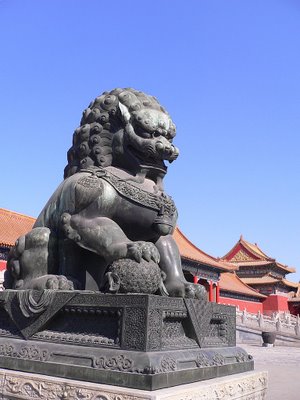 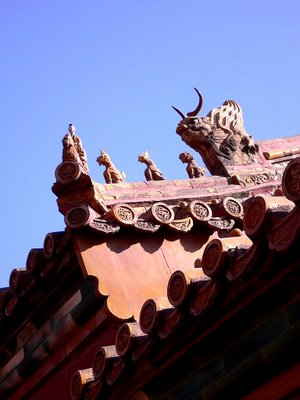 The Forbidden Palace was the seat of Qing dynastic rule for over 400 years. Guardian lions and fantastical rooftop beasts stand in perpetual vigil, casting magic protection over the Manchu emperor and his royal retinue. Emperor Qian Long reigned 60 years. His calligraphic inscription Zheng Da Guang Ming - Incorruptible Righteousness - hangs above his throne. 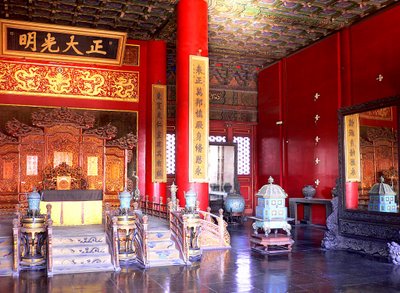 |
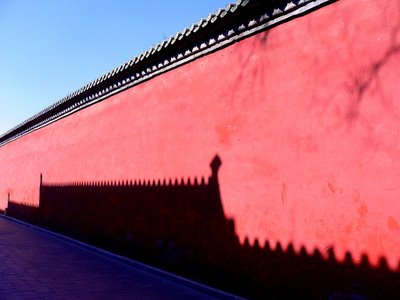 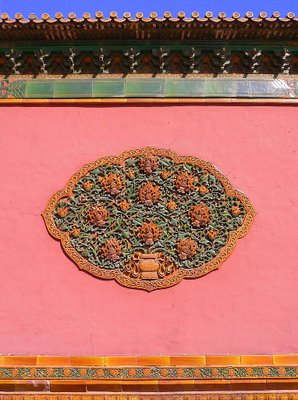 Believed to ward off evil charms and spirits, auspicious red is everywhere. Palace walls and courtyard gates are coated in burnished crimson hues. Delicate ceramic tiles with recurring floral peony motifs adorn walls and columns. 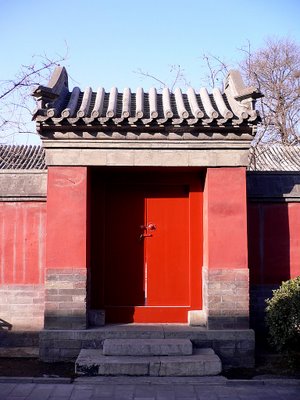 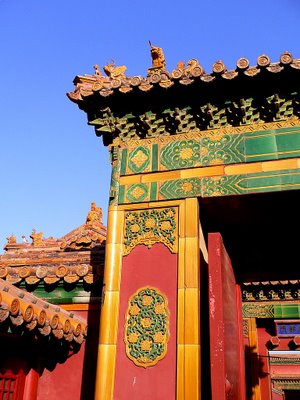 |
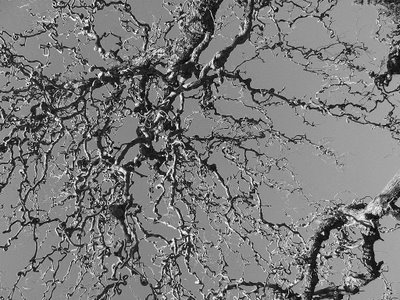 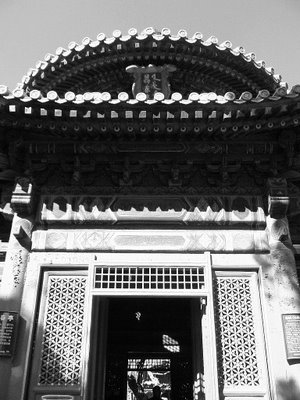 The Imperial Garden, behind the royal palaces, edges the northern palace wall. Within its compact compound, stylized rock sculptures, miniature pavilions and countless ornamental trees, centuries old, are meticulously laid out, no doubt after strict Feng Shui principles. |
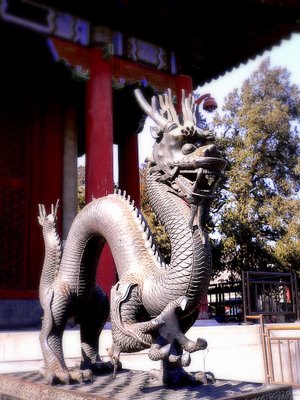 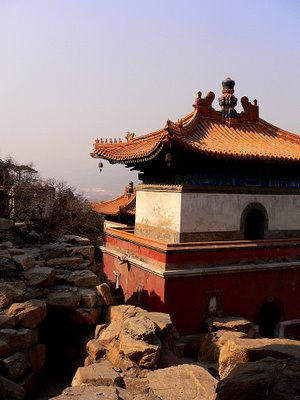 The Summer Palace, Yi He Yuan, was rebuilt following Western army ruination, using war funds expropriated by the infamous Empress Dowager Ci Xi. It became her summer Xanadu. Palaces were erected on Wan Shou Shan - Longevity Mount - and on the banks of Kunming Lake at its base. Temples built for imperial religious edification dot the landscape. Times have not been kind. Beheaded Buddha statues are scarred reminders of zealous cultural purification in the 60's. 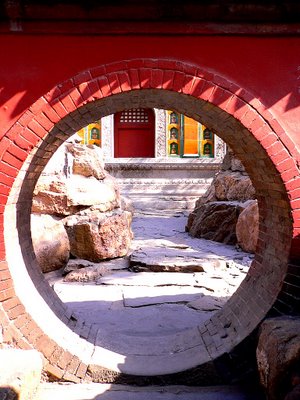 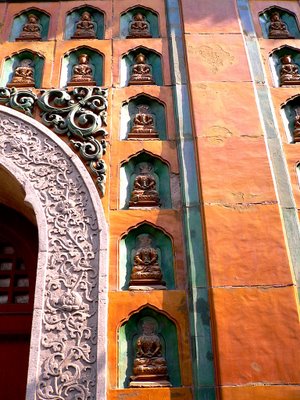 |
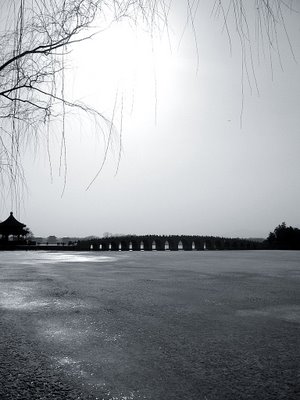 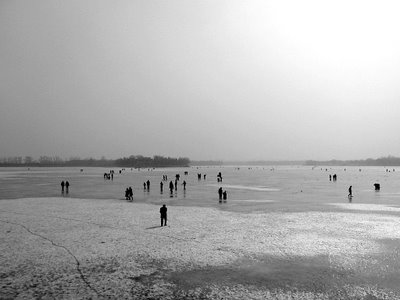 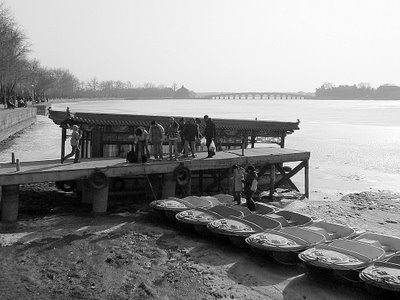 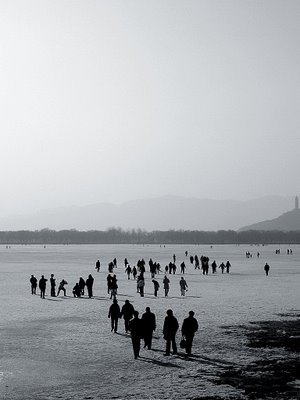 |
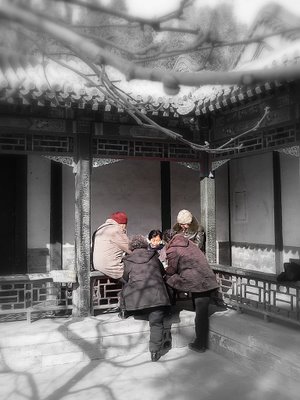 A long gallery Chang Lang connects the pavilions ringing Kunming Lake. Strolling, I chance upon these women playing cards. With impenetrable quiet concentration. |
Labels: Beijing, China, history, lake, palace, religious site

Licensed under Creative Commons Attribution-NonCommercial-NoDerivs 2.5 License

These are the 30 countries that I have ever set foot on. Airport stopovers don't count!
